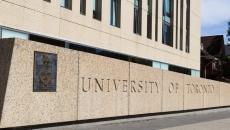A new study says more Canadian university and college students who identify as women were sexually assaulted in a postsecondary setting over a year than those who identify as men, with the majority of sexual assaults perpetrated by other students.
Data released today by Statistics Canada show 11 per cent of students who identify as women were sexually assaulted in a college or university setting in the year before the survey, compared with four per cent of those who identify as men.
The study says sexual assaults in the postsecondary setting during that period most often took the form of unwanted sexual touching, which accounted for 86 per cent of incidents for women and 83 per cent for men.
It says other students were behind the sexual assaults in similar proportions for women and men -- 60 per cent and 61 per cent, respectively.
The data show students also carried out the majority of other unwanted sexualized behaviours such as catcalls and unwelcome physical contact, with 80 per cent of women and 86 per cent of men who experienced such behaviours saying their peers were behind the incidents.
The study says relatively few students reported that a person in a position of authority, such as a professor, engaged in such conduct, but it was more common for women who had experienced unwanted sexualized behaviours than men.
The study notes that while the COVID-19 pandemic has triggered a shift to online learning over in-person classes, the data provide "important insight" for schools on how to better prevent and address such behaviours in post-secondary institutions.
"People who experience unwanted sexualized behaviours can feel disrespected, uncomfortable and unsafe, and this type of victimization can have immediate and long-term impacts on well-being and mental health," the study says.
Seventy-one per cent of post-secondary students said they witnessed or experienced unwanted sexualized behaviours involving students or other people associated with the school either on or off campus or online, though more women were on the receiving end than men.
Forty-five per cent of women reported personally experiencing such behaviours, which include inappropriate communiccations and suggested sexual relations, compared with 32 per cent of men, according to the survey.
Women were more likely than men to view unwanted sexualized behaviours as offensive, though some, such as taking or posting inappropriate photos of any student without consent, were seen as offensive by large proportions of both women and men.
Forty per cent of male students agreed or strongly agreed that "people get too offended by sexual comments, jokes or gestures," nearly double the proportion of female students who shared that view, the study showed.
More than half of women and just over 40 per cent of men said they had intervened at least once when witnessing unwanted sexual behaviours, though more than 90 per cent overall said there was at least one instance where they did not step in.
Women were more likely to report that they didn't intervene because they felt uncomfortable, with 48 per cent citing that reason compared with 25 per cent of men.
More women also said they feared negative consequences -- 28 per cent compared with 18 per cent of men -- or were worried for their safety -- 18 per cent compared with eight per cent of men.
More women who experienced unwanted sexual behaviours in a college or university setting also reported they felt fearful as a result, with 23 per cent of women and four per cent of men saying that was the case.
But few students who experienced unwanted sexual behaviours or were sexually assaulted said they discussed it with someone associated with the school.
Nine per cent of women and four per cent of men who experienced unwanted sexual behaviours said they disclosed what happened to someone at the school; eight per cent of women and six per cent of men who were sexually assaulted did so, the study says.
Three per cent of women who were sexually assaulted in a college or university setting said they reported an incident to police.
While the survey found most students expressed positive views about their school's policies and procedures on sexual assaults and unwanted sexual behaviours, students who had experienced those things generally had more negative opinions on school policies than those who hadn't.






